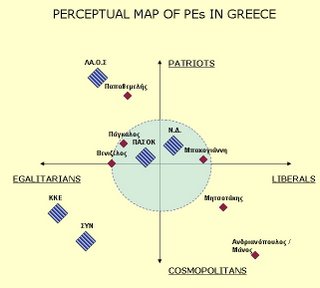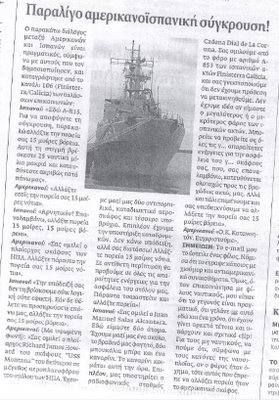In the Greek political arena labels tend to be uninformative and arbitrary. “Reactionary”, “patriotic”, “progressive”, “conservative”, it is all a mess. Here I try to systemize some thoughts I had on the issue and to provide a perceptual map and a positioning framework as tools to better understand the dynamics in the Greek political scene.
Some definitions/assumptions:
Political Entities (PEs from now on) refer to politicians, political parties, or any other active entities with distinct ideological coordinates. We approach the voting process as a market, the PEs as the products and the electorate as the consumers with equal purchasing power (their vote).
PEs, like all products, are positioned in a perceptual map by the electorate across several dimensions. Although there are many significant dimensions, I chose the two that explain best most of the positioning process, with the minimum overlap. These are
(1):
-Attitude towards Markets. On one side of this axis are the PEs that tend to be friendly and supportive of business, capitalism, free markets and globalization (I call these Liberals); on the other extreme are the PEs that support a big state and egalitarianism (I call these Egalitarians)
-Attitude towards National Issues. On one side of this axis are the PEs that are characterized by assertiveness for various national non-domestic issues, pride for the Greek heritage and Greek character of our society and aspiration to promote “Hellenism”, (I call these Patriots); on the other side are the PEs that demonstrate internationalism, a focus on global issues, and a relativistic-skeptic attitude towards national identity (I call these Cosmopolitans)
(2) .
Using a Cartesian coordinate system we can visualize the relative positioning of the PEs based on the above dimensions:

It needs to be stressed that these are the positions of the politicians as they perceived on average by the electorate and not an “objective” assessment of their political coordinates. For example, in my opinion Μητσοτάκης is far more “patriotic” than generally perceived.
Two interesting observations:
One assumption is that the preferences of the electorate are normally distributed around the two axes. Thus the political parties, especially the bigger ones, are closer to the (0,0) point, because they need to capture a bigger chunk of the electorate. However, individual PEs (politicians) can position themselves successfully on a longer Cartesian distance from the centre because to be elected they need to capture only a tiny share of the total electorate.
The second observation has to do with the existence of a distinct market void in the first quadrant (Patriotic – Liberal). Assuming no fundamental incompatibility between the two positions and normally distributed preferences, there is an unsatisfied electoral clientele waiting.
Any Patriotic-Liberal politician out there?
_________________________________
(1).I do not use the common dimension of “conservative” vs “progressive” for several reasons:
First, it is defined fundamentally different for different strata of the electorate. Second, it is too vague, can refer to such different issues as church, environment, tolerance to corruption and crime. Third, I believe that Greece as most of Europe is ideologically very homogeneous in all the above issues. That means that we don’t really notice any critical differences between political entities in the above issues. Almost all Greeks are pro-environment, pro-abortion, rather tolerant to crime, non-practicing orthodox Christians etc. Consider for example a rather common profile: urban, non-religious, job in services middle management level, has studied/lived abroad, wants more toughness on crime and corruption, cares about the environment and supports family values. "Conservative" or "Progressive" are labels that make little sense in this case, if any.
(2). This is not a normative statement but rather a descriptive analysis. That means that I don’t suggest that the above dimensions should matter, I just claim that these dimensions currently explain better the emotional attitudes and preferences of the electorate.




